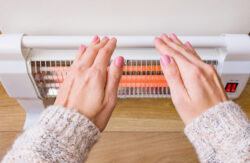We’ve got a couple of months of winter left – worried about keeping warm with lower costs? (Picture: Getty)
As the cost of living crisis continues into 2023 – with the added stress that people will be paying off the debts of Christmas – any cost cutting corners will be welcomed.
From using dehumidifiers to dry your clothes to using a slow cooker, there’s plenty of cost of living hacks to worth trying. But there are some that might just prove to be false – like leaving your lights on all day to save the cost of your lights turning on and off.
But, with the cold of January settling in, what about keeping warm at home? Could a halogen heater be the trick to keeping warm while keeping bills lower?
How much does a halogen heater cost to run?
One of the first considerations about halogen heaters is just how much they cost to run.
Website Best Halogen Heaters has taken the UK average energy price tariff to give a close estimate on the running costs.
They estimate a 1,000W (1Kw) halogen heater costs around 15p per hour and a more powerful 1200w halogen heater running cost would be 18p per hour.
Directional heat from halogen heaters are good for individuals, but not the most efficient (Picture: Getty)
Are halogen heaters more efficient than central heating?
Knowing the average cost of running a halogen heater, the next question to ask when it comes to whether it’s more efficient for you is how you plan on using one.
If you need to heat a whole home – or multiple bedrooms – using halogen heaters will not be the most efficient method. It’s only efficient if you’re heating a very small area, or your own self.
A halogen heater, therefore, could be efficient if you are only responsible for one bedroom in a house, like a bedsit or a flat share. Generally though, it’s best to rely on central heating.
As per Money Saving Expert: ‘Halogen heaters are directional. Once on, you instantly feel the heat. As soon as you turn them off, the heat quickly dissipates. Convection heaters, electric panel heaters or free-standing electric radiators work by heating the air around them to create a convection current. They take some time to heat a room, but once turned off the heat lingers.’
To view this video please enable JavaScript, and consider upgrading to a web
browser that
supports HTML5
video
‘Usually, it’s best to use your central heating to heat your home rather than relying on electric heaters, especially if you have gas central heating, according to the Energy Saving Trust.’
‘If you’re only using a couple of rooms, you can use thermostatic radiator valves so that your central heating isn’t heating empty rooms. Electricity is much more expensive than gas, so using electric heaters can ramp up your energy bills.’
Another benefit to using central heating is that it helps ward off damp, which would be costly to fix if you let spread through your home.
MORE : As costs soar, meet the people swapping bricks and mortar for a life afloat
MORE : A third of Brits are giving up gym memberships due to cost of living worries
Follow Metro across our social channels, on Facebook, Twitter and Instagram.
Share your views in the comments below.
Scared about being burnt by high bills? Here’s what you need to know about heaters





